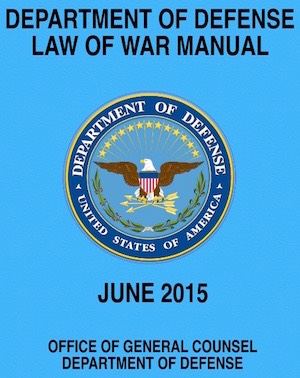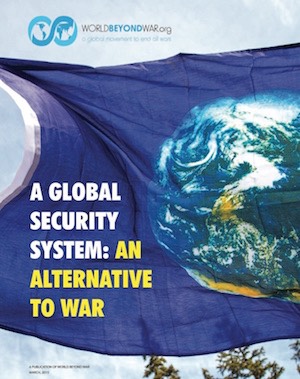Bestaan er legale oorlogen? Ja, dat zijn verdedigingsoorlogen. Daarom spannen regeringen zich altijd erg in om als ze een illegale oorlog beginnen het te laten lijken op zelfverdediging. Maar het is absurd als landen hun handelsbelangen aan de andere kant van de wereld voorstellen als hun landsbelang. Onder politici heb je altijd genoeg carrièrejagers en militaristen die met rode koppen tot de aanval oproepen. Zeker in een land waar militarisme een industrie is. Nederland weet maar al te goed dat de meeste oorlogen illegaal zijn. Daarom doen wij meestal ook maar schoorvoetend mee. Vaak gaat het ook faliekant mis. Maar ja, als Grote Broer de wet stelt, dan buigen onze politici. Vroeger heetten ministeries van defensie gewoon ministeries van oorlog. Dat zou in elk geval voor de VS een veel betere naam zijn. Indien Nederland echt meent dat vreedzame handel en nijverheid de basis zijn van de maatschappij dan wordt het tijd om oorlog vaarwel te zeggen. Ook Obama maakte geen verschil, hij staat gewoon in de lijst van Amerikaanse oorlogsmisdadigers. Beter is de wereld in elk geval niet geworden van zijn presidentschap. En God Save America als Hillary president wordt. Een tweede Thatcher op wereldschaal kan deze wereld zich niet veroorloven.
WorldBeyondWar: "The Pentagon has just published 1,204 pages on how it thinks you can behave legally during a war. Looking through this “Law of War Manual” at various hot topics, one finds some atrocities excused as acceptable (cluster bombs, nuclear bombs) and others rejected as completely disallowed (torture) even when in reality they are routinely engaged in.
Beginning to wonder what the point is of writing out such a lengthy description of laws when someone could just read the laws themselves in less time, I notice that nowhere does this document strengthen any actual law, while in many places it weakens them. It picks and chooses which laws to mention and which to leave out or marginalize in footnotes. It stresses the supposed right to ignore any international law that a nation objected to while that law was being created. It incorporates into the whole scheme the idea of launching wars not only against nations, but against any other entities, and of launching wars in nations with those nations’ approval. This paper is a sort of enormous signing statement appended retroactively to all existing laws, indicating which will be adhered to and which disregarded, while attempting to advertise a pattern of legal behavior by the U.S. military as a public relations correction to people’s awareness of the actual pattern of lawlessness.
But I think the place to start is with the pretense that war itself is legal. This is what permits three-quarters of this document to exist, devoted as those sections are to proper legal conduct during a war. The Pentagon says that one must fight wars legally whether or not the wars are legal. That is, whether or not you have some legal justification for attacking a country, you must nonetheless meet completely vague standards of proportionality and so forth during the course of the attack — or of the occupation. There’s a large section on the legal conduct of occupations that breezes right past any question of the illegality of maintaining the occupation at all. Here’s a typical passage about legal “proportionality”: “Attacks using nuclear weapons must not be conducted when the expected incidental harm to civilians is excessive compared to the military advantage expected to be gained.” How much “harm” to civilians from nuclear weapons would be “excessive”? The so-called law, once you accept war and then try to regulate its conduct, is in the eye of the sociopathic beholder; there’s nothing empirical or enforceable about it.
The short section of this manual on what makes wars themselves legal is of particular interest, I think, because it — in fact — ends up admitting that they are not. It doesn’t intend to make this point, however. In fact, it goes to every effort to suggest that legality is something murky, almost something aesthetic, laying out a number of “principles” to consider in deciding whether to begin a mass slaughter of human beings. Is a “competent authority” making the decision? Is the action “proportionate”? Have all peaceful alternatives been exhausted? That last one, actually, would ban every war the United States has ever launched, including all current ones, if the facts of each situation were dealt with honestly — but when does that ever happen?
Eventually, the manual comes around to mentioning a law: the U.N. Charter. It gives this tiny part of its text the heading “Prohibition on Certain Uses of Force,” but quotes the Charter: “All Members shall refrain in their international relations from the threat or use of force against the territorial integrity or political independence of any State, or in any other manner inconsistent with the Purposes of the United Nations.” The “purposes” in Chapter I of the Charter are focused on the need “to maintain international peace.”
And the manual notes: “Numerous other treaties also reflect these prohibitions on the threat or use of force.”
WorldBeyondWar: "World Beyond War is pleased to provide the book that everyone has been asking for: A Global Security System: An Alternative to War. It describes the “hardware” of creating a peace system, and the “software” — the values and concepts — necessary to operate a peace system and the means to spread these globally.”
Executive Summary: "Resting on a convincing body of evidence that violence is not a necessary component of conflict among states and between states and non-state actors, World Beyond War asserts that war itself can be ended. We humans have lived without war for most of our existence and most people live without war most of the time. Warfare arose about 6,000 years ago (less than .5% of our existence as Homo sapiens) and spawned a vicious cycle of warfare as peoples, fearing attack by militarized states found it necessary to imitate them and so began the cycle of violence that has culminated in the last 100 years in a condition of permawar. War now threatens to destroy civilization as weapons have become ever more destructive. However, in the last 150 years, revolutionary new knowledge and methods of nonviolent conflict management have been developing that lead us to assert that it is time to end warfare and that we can do so by mobilizing millions around a global effort.
This report presents a comprehensive blueprint for peace as the basis of an action plan to finally end war.
This report presents a comprehensive blueprint for peace as the basis of an action plan to finally end war.
It begins with a provocative “Vision of Peace” which may seem to some to be utopian until one reads the rest of the report which comprises the means for achieving it. The first two parts of the report present an analysis of how the current war system works, the desirability and necessity of replacing it, and an analysis of why doing this is possible. The next part outlines the Alternative Global Security System, rejecting the failed system of national security and replacing it with the concept of common security (no one is safe until all are safe). This relies on three broad strategies for humanity to end war, including thirteen strategies for 1) demilitarizing security and twenty-one strategies for 2) managing conflicts without violence and 3) creating a culture of peace. The first two are the steps to dismantling the war machine and replacing it with a peace system that will provide a more assured common security. These two comprise the “hardware” of creating a peace system. The next section, eleven strategies for accelerating the already developing Culture of Peace, provides the “software,” that is, the values and concepts necessary to operate a peace system and the means to spread these globally. The remainder of the report addresses reasons for optimism and what the individual can do, and ends with a resource guide for further study.”
Af en toe geeft de CIA documenten vrij waaruit blijkt dat de werkelijkheid toch iets anders in mekaar zat dan men ons wilde doen geloven. Over 9/11 weten we nog heel veel niet. De betrokkenheid van Saoedi-Arabië bij al-Qaeda en ISIS is een onderwerp dat nog taboe is. Het Nederlandse hof heeft veel geld gedeponeerd in Saoedi-Arabië. Tja, hoe zullen we dat varkentje wassen? Wordt het een onderwerp op de Bilderberg conferentie die dit weekend wordt gehouden in Telfs-Buchen, Oostenrijk? Ik denk het niet. Beatrix, Rutte en nog een aantal bobo’s zijn wel aanwezig.


